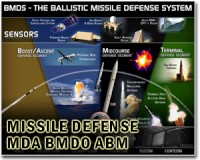| . |  |
. |
Tel Aviv, Israel (UPI) Dec 27, 2010 Israel's increasingly troubled missile defense shield has taken another knock with media reports that budgetary problems could force the U.S. administration to delay funding for the system still being developed by Israel's defense industry. The aid could be put back several months, the liberal Haaretz daily reports. That's likely to heighten Israeli concerns over the vulnerability of the country's cities at a time when the Jewish state faces the growing threat of missile attack on an unprecedented scale from almost every quarter. Haaretz said the problem stems from U.S. President Barack Obama's difficulties in pushing next year's budget through a recalcitrant U.S. Congress. That could result in "a long wait before the weapons can be bought" from the main manufacturer, Rafael Advanced Defense Systems. The state-owned company, one of Israel's leading arms manufacturers, has produced one anti-missile defense system known as Iron Dome, and is developing another, David's Sling, with the Raytheon Co. of Maryland. The Israeli government has bought two mobile Iron Dome batteries, each costing around $37 million. It needs at least a dozen more in the near future to provide minimal protection but doesn't have adequate funds. Iron Dome, which was supposed to have been certified operational several months ago, is designed to intercept and destroy short-range missiles and rockets such as the Soviet-designed Katyushas and Grads used by Hezbollah in Lebanon and Hamas in the Gaza Strip. David's Sling would be used to shoot down medium-range missiles. The third layer in the defense shield, the high-altitude, long-range Arrow-2 system designed to down ballistic missiles, has been deployed since 2000. It is built by the flagship Israel Aerospace Industries, which is developing a more advanced variant, Arrow-3. In May, the U.S. House of Representatives approved Obama's decision to provide $205 million in special aid to buy additional Iron Dome batteries. The Americans are also jointly funding the Arrow program, although it's not clear if this will be affected. In September, the United States and Israel agreed to advance work on David's Sling being developed by Rafael and Raytheon. But it isn't expected to be operational until 2012. However, Obama, whose administration has been reeling since Republicans scored heavily in the midterm elections, is seen as having problems getting many of his measures through Congress. He signed a presidential order outlining his administration's plans until March. That covers the current budget and permits him to spend 1/12th of the 2010 budget every month until March. Haaretz reported that "under these circumstances, funding for Iron Dome will have to wait until the annual U.S. budget is approved in March." It said the delays will mean the planned increase of overall U.S. military aid to Israel will also be slowed down. Israel was to have received $3 billion in 2011 but the aid package will likely remain at this year's level of 2.775 billion. That will affect the Defense Ministry's annual planning. Haaretz reported the delays mean that "no plan or estimated timetable is in place for producing and purchasing" Iron Dome because there is no U.S. or Israeli funding in place. The Israeli government has yet to decide on "additional funding to buy more Iron Dome batteries," the newspaper said. Even without these problems, Iron Dome, and indeed the three-tiered missile defense shield, was facing mounting skepticism about its capabilities against mass salvoes of missiles. Iron Dome was unveiled with great fanfare in July, two years ahead of schedule after Rafael reportedly had been paid a big bonus to get the system ready before its original 2012 target date. And then, surprisingly, the military put the two batteries it had in storage in November, claiming crews needed more training on such a complex system. On Dec. 12, Maj. Gen. Gadi Eisenkot, head of the Northern Command facing Hezbollah, dropped a bombshell: Even though Israeli cities are expected to be primary targets for enemy missiles, the anti-missile systems "are designed to protect military bases, even if this means that citizens suffer discomfort." These developments have fueled suspicions the defense shield is unlikely to protect the civilian population from what many fear will be the most sustained and destructive bombardment unleashed against Israel.
Share This Article With Planet Earth
Related Links Learn about missile defense at SpaceWar.com Learn about nuclear weapons doctrine and defense at SpaceWar.com All about missiles at SpaceWar.com Learn about the Superpowers of the 21st Century at SpaceWar.com
 Poland asked US about missile shield uses: WikiLeaks
Poland asked US about missile shield uses: WikiLeaksLondon (AFP) Dec 7, 2010 The US told Poland that a proposed American and NATO missile shield aimed at defending against attacks from Iran or Syria could be used to stop "missiles coming from elsewhere," US cables released by WikiLeaks showed Tuesday. Despite repeated claims that the shield is not aimed at deterring attacks from Russia, the correspondence suggests US officials have considered broader uses for the def ... read more |
|
| The content herein, unless otherwise known to be public domain, are Copyright 1995-2010 - SpaceDaily. AFP and UPI Wire Stories are copyright Agence France-Presse and United Press International. ESA Portal Reports are copyright European Space Agency. All NASA sourced material is public domain. Additional copyrights may apply in whole or part to other bona fide parties. Advertising does not imply endorsement,agreement or approval of any opinions, statements or information provided by SpaceDaily on any Web page published or hosted by SpaceDaily. Privacy Statement |